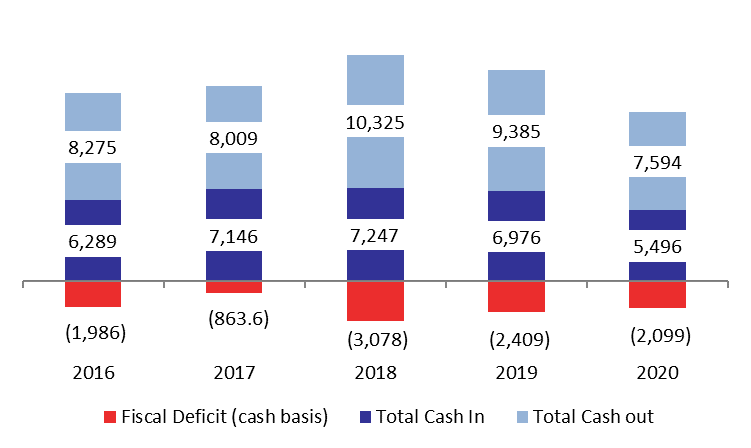According to Ministry of Finance (MoF) latest figures, Lebanon’s fiscal deficit (cash basis) stood at $2.09B by July 2020, down from last year’s $2.41B.
In detail, the substantial deficit is attributed to the annual 21.22% drop in government revenues (including treasuries) which fell to $5.49B by July 2020. On the counterpart, total expenditures (including treasuries) retreated yearly by 19.08% to $7.59B in the first seven months of the year. It is worth noting that the primary balance which excludes debt service posted a deficit of $706.84M, compared to a surplus of $577.22M during the same period last year.
Fiscal revenues recorded a yearly drop by 28.59% to stand at $4.77B. In fact, the financial crisis continued to affect the workforce sector in Lebanon, and as a result of higher unemployment rates, Tax revenues (constituting 84.51% of total revenues) retreated by an annual 27.43% to $4.03B by July 2020, Revenues from VAT (16.47% of total tax receipts) dropped by 55.21% y-o-y to $663.89M. The drop in “VAT revenues” is most probably attributed to the deterioration of Lebanese purchasing power with the decrease in value of Lebanese pound, which obligated Lebanese people to rationalize their spending. Meanwhile, and as a result of the reduction in Lebanese international trade in general and specifically imports, “customs revenues” (12.44% of tax receipts) dropped by 33.03% year-on-year (y-o-y) to $501.35M. Moreover, in order to liberate their money from the banks, depositors are investing more in real estate, which explain the steady increase in real estate registrations fees from the beginning of 2020 (8.41% of the tax revenues) to stand at $338.81M by July 2020.
As for Non-tax revenues (15.49% of total revenues), they dropped from $1.12B by July 2019 to $738.51M by July 2020. Meanwhile, “Telecom revenues” (constituting 26.95% of total non-tax revenues) shrunk yearly by 56.53% to reach $199M by July 2020. It’s worth mentioning that “Zain” (Kuwaiti Mobile Telecommunications Company) exited the “touch” management process and handed over the company to a new management and board of directors appointed by the Lebanese Ministry of Communications. However, a further reduction in Telecom revenues is expected for the upcoming months, as this sector is strongly affected by Lebanese political conflict.
On the expenditures’ side, total government spending recorded a yearly drop by 23.23% to hit $6.64B by July 2020. In details, transfers to Electricity du Liban (EDL) (10.2% of general expenditure) slid by 36.19% to reach $535.16M. Moreover, total debt servicing (including the interest payments and principal repayment) reached $1.39B by July 2020, down by a yearly 53.38% such that interest payments alone retreated by 54.5% y-o-y to $1.3B. In details, interest payments on domestic debt slumped by 32.94% y-o-y to $1.16B. Meanwhile, interest payments on foreign debt registered a year-on-year significant drop by 87.63% to $139.74M, noting that on March 7 2020 the Lebanese government announced for the first time that Lebanon will not pay a $1.2B Eurobond due on March 9 and will seek to restructure its sovereign foreign currency debt.
In its turn, the treasury transactions (includes revenues and spending that are of temporary nature) posted a deficit of $229.64M compared to a deficit $440.99M by July 2019.
Lebanon is in middle of rigorous financial crisis. The new Lebanese government needs to set a plan in order to reduce the budget deficit by, among many others, imposing new reforms on energy sector. Specifically, it should solve the problem of EDL, one of the main conditions of IMF to help Lebanon, and stop the irrational wasteful spending.
Yearly Fiscal deficit by July (in $M)
